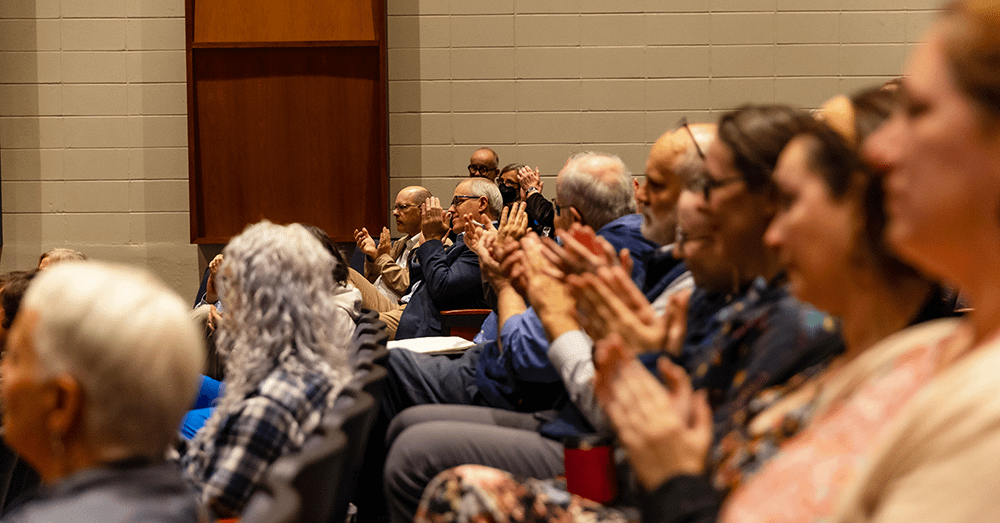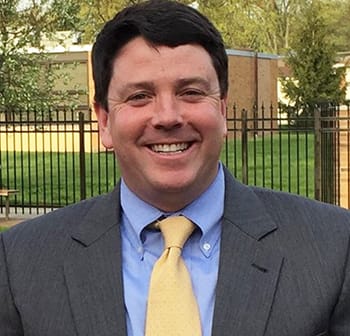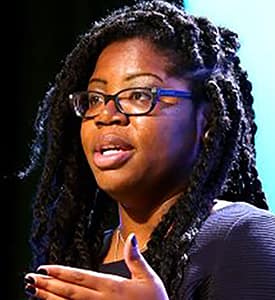Lee, others engage with MLK themes

Directly above, Rev. Lee delivering his keynote. More scenes from the MLK Convocation by student photographer Aaron Kalat ’19 are throughout the story.
In two provocative, faith-anchored campus talks to start a week of important conversations on race for the Saint Michael’s College community, the young southern preacher Robert Lee IV laid out a program for challenging white supremacy that emanates from “Power, the Pulpit and Policy.”
Those themes culminated his keynote talk during the main MLK JR. Convocation late Monday in the College chapel, where hundreds of students, faculty, staff and wider community members also were transfixed and challenged by a message from Lauren Stone ’19 about “invisibility” and her too-often rough experiences living with disability. They also heard bracing and hopeful wisdom from President Jack Neuhauser, who was speaking one last time at this major annual campus gathering before his tenure winds down at the end of June.
Dr. Moise St. Louis, the College’s associate dean of students and director of The Center for Multicultural Affairs, masterfully set context for the week, at the Convocation and earlier at a well-attended luncheon in Dion Family Student Center where Lee began engaging the week’s animating theme:
Lee, a pastor, author, activist, commentator, writer and preacher who is descended from famous Confederate general Robert. E. Lee, gained prominence this year when he spoke out firmly and unambiguously against white supremacy, including on NPR and during an MTV awards broadcast, following controversy over statues of his general/ancestor and those statues’ future in Southern communities.
In his keynote, Lee offered his “Three P’s of this conversation” as concrete examples of “how to go about making a difference on the issues of racism and white supremacy.”
“How are you sharing POWER and this microphone with voices of color, with minority groups and other minority voices?” he asked, going on to explain that PULPIT in his formulation means “How are you hearing from the Holy Word of God that you are beloved, and others are as well?” On that point he quoted the poet Galway Kinnell that “sometimes it’s necessary to reteach a thing its loveliness.” POLICY to him means, “How are you calling your elected officials – or becoming them – who change the course of this nation?” He noted elections are coming up in 2018, and told students, “ you are old enough to make a difference –so by God, do it — be the change you wish to see.”
Other key points and memorable phrases from Lee’s two Monday addresses:
Talking with mostly faculty at the luncheon about what he’s learned as a young classroom professor starting out at Appalachian State (when not pastoring a church or touring to speak up on racism), he quoted the Bible’s B
In his keynote, Lee departed from his text at the start to offer encouragement to Lauren Stone, the student who had just spoken before him on the theme of “invisibility” for minorities. Lee told Stone, “You are seen as somebody valued by God and this community and deserve to be recognized for speaking up.” Other memorable keynote excerpts: “It’s a lonely road to walk when you decide to speak up,’ he said, explaining how he often hears fellow whites saying they are “tired” of this or that organization, or view, or those speaking up on racism — “tired of always hearing about Black Lives Matter or LBGTQ rights” because “white people are somehow more tired than the rest of us [and] have the ability to ignore what’s going on about us,” he said … but, “White supremacy
The earlier-referenced Lauren Stone, a junior sociology major with a passion for writing who uses a wheelchair and has a large service dog that is well-known by sight on campus, came to the elevated altar area to speak out on the “Cost of Silence” theme, making a lasting impression with her insights — particularly near the start when she frankly shared a heartbreaking account of falling from her wheelchair outside the College’s student center last semester during a busy time of day and – incredibly — watching student after student walk past without looking at her or seeking to help or acknowledging her on the ground in distress. Finally a dog-walking stranger from off campus happened by and helped. “She was the only one who truly saw me,” Stone said. Later eloquent words from Stone: “Societal invisibility hides something far more valuable – your humanity” For some, she said, “their visibility becomes a vehicle of isolation,” such as one in a wheelchair or with a different skin color, as unfortunately has found her boyfriend of Indian descent, she recounted. “Brown equals terrorist – wheelchair equals abnormal,” she said. “We dehumanize those we want to feel separate from ….those who we would not want to trade places with…” Concluding, Stone said, “I challenge each of us to find strength, responsibility, and willingness to reach out to those who are invisible, not just those in peril. …It’s through seeing another’s humanity that we begin to see our own.”
President Jack Neuhauser spoke early in the program, following an introduction from Melanie Castillo, president of the MLK Jr. Society, some bea
President Neuhauser spoke touchingly, as he has at past MLK Convocations, 
“Let us each remember that honoring Dr. King’s memory compels both action and generosity in each of us,” the president said. “We are compelled to not be silent just as we are compelled to listen to the cry of others.” He said he hoped the coming week of programs “Helps all of us to speak and to listen with a deeper understanding.”
Moise St. Louis led one of the most affecting moments of the Convocation during his remarks when, in a succession of questions posed to the assembled, he asked them to acknowledge, by standing or raising hands depending on the question being responded to, if they had known a range of experiences — from being targeting to speaking out to being uncomfortable, or thinking something was wrong that they witnessed but feeling powerless. The many who stood or raised hands drove home the speaker’s intended point: “Now look around and see that you are not alone – that you are NOT ALONE” … [and] “that you have the power to stand up so that others can feel your presence and your conviction; … when the fear strikes you and you feel that you can’t stand up, remember how many hands were raised around you and how many in our community stood up — and remember that you’re not alone.”






